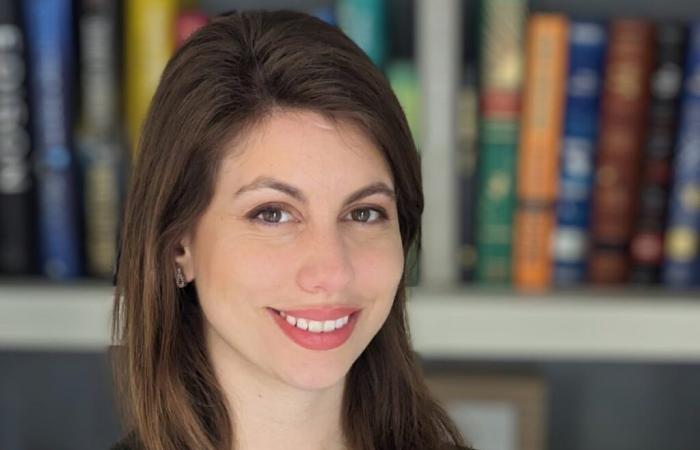
The Marine Lopes journalist and writer (São Paulo, 36 years old) discovered the importance of living in community, especially when they have children, after having the opportunity for their work to travel through countries such as Mozambique, Indonesia, Singapore, Japan, Sweden and France – was a correspondent for correspondent The Washington Post In Brazil From 2016 to 2020. In all these places, Lopes investigated the different ways and values of parenting, which led him, once back to the United States – Vive in Washington – to write his first book, Please Yell at My Kids (Please shout my childrenin Spanish, not available in Spain and edited by Balance, 2025).
In the book, the attached communication professor at the American University in the critical American capital that current parenting is increasingly individualistic and is subject to achieve unreal and extremely perfectionist objectives. Therefore, he defends, to shield and sword, the importance of living motherhood and paternity in community. “The goal is a raising in which we help each other as normal, not only when extraordinary things happen,” says this mother of two children during the telephone talk with the country.
ASK. Why did you choose your book Please Yell at My Kids?
ANSWER. Traveling I noticed that in all these countries, which have a very strong sense of community, people scold the children of others. The way it works, for example, in the Netherlands is that if you see a child behaving badly, you can say: “Eh, you! Stop doing that.” Instead, in the United States you don’t do that. It is considered something very bad to scold the children of another because you do not know what parenting philosophy is following, and I think people are very afraid to educate the children of others. But what I saw in Singapore, in Malaysia, in Mozambique, in Brazil, is that when you scold the children of another person you are not only scolding, you also hug them, you praise you, you are educating them. Crying should not only be the responsibility of one or two people. It should be the responsibility of the community. So the idea of Please Yell at My Kids It’s a “please, come and help me educate my children.” It’s like saying: “Help me with parenting. Let’s do it together.”
P. What inspired you to explore the different parenting cultures?
R. I think it was when I became a mother. It was when I realized how many parenting decisions are cultural decisions. When you have a child you have to make many decisions: about sleep, about what you are going to eat, how you are going to discipline it. And I realized that many of these decisions are different culturally, even the time of birth is different.
P. What is different?
R. Each country has its rituals. For example, in Brazil, birth is a party. You invite all the people around you, as 40 or so, and are there at the moment when the child is born, even in the operating room, if it is caesarean section they can be. Then they stay, they bring food and decorate the hospital room. Some hospitals even have wine stores to choose the one you are going to serve in the hospital room.
P. And does that situation not exhaust the mother after childbirth?
R. In my case, although I knew it was going to be nice to have the family and friends there, it seemed exhausting. And even so, when they were all there, my family, like 30 people, from Brazil and that of the United States, friends of my parents, grandparents, uncles … and it was not easy to have them there because my childbirth was difficult and my son was in the neonatal ICU. My son was not with me in the room and cried all day. And I thought: “Please go home.” But they didn’t leave. They came every day and I realized how much I needed them. And I started telling them how they were and took my hand, they told me their experiences and felt how I filled me with wisdom of different generations. And my relatives were not only there at birth, they helped me the first year with breastfeeding, with the baby’s dream … and I realized the value of the community in parenting. That the important thing was not the party, it was the community.
P. When did you move to other countries there was something that caught their attention on how they raised?
R. The current trend in all countries is to raise individualist, although in all there are traces of that upbringing in community. If you observe them, they are there. And I was imposed a rescue mission: to locate those traces to be able to put them into practice in 2025. In Holland, for example, there is a tradition that is called the forest dropping. It is that parents leave their children alone, between 10 and 12 years, in the forest, with a flashlight and something to eat, and the end is to find the way home. They do it every summer and it is a tradition full of love. For me it was surprising and, as I always do, I tried to try tradition with my children. And although I did not take them to the forest, they are five and seven years old, I tried to give them more independence and freedom in the neighborhood and let them ride alone by bicycle. Not far from home, at a reasonable distance to see them. But one day a policeman saw them and told me: “It is not good for children to bicycle without supervision. It is not safe.” I failed. So how can I make everyone feel safe and I don’t look crazy? And the conclusion was the same again: we have to do it together, in community.
P. But it seems that fathers and mothers are more scared now, how can you work that emotion?
R. The message I learned from the Dutch is that to raise you don’t have to be afraid, you have to be prepared. How do your children prepare? Well, you teach them to know how to get home, how to ask for help if they need it or how to cross the street safely … but it is very difficult for a person to change this culture of fear, you have to do it with more people. And then when I talk to the parents I tell them: “We are all afraid, but something has to change. We are all tired, we are worried, because we see the lack of independence and freedom of our children, even in adolescents who do very few things for themselves.” And we protect, we protect, and when we are not they will not know how to do anything. What we are doing now is not working. And I really see the need for community to face all this better together.
P. Could you give another example of the parenting model that surprised you from some other country?
R. In Mozambique, because the country has had many difficulties – it is one of the poorest in the world, with one of the highest AIDS rates, and had a civil war for a long time – family connections, blood ties as a mother, father or grandmother, are not as important as the neighbors. The people who care for you are your neighbors. And it is very interesting. There to a neighbor “Mom.” I was very surprised by this level of community that they have established in their daily lives. When you need Mozambique help, there are 30 neighbors you can call.
P. And how is it to do this in the United States, how a community is created in such an individualistic country?
R. We returned from Singapore a year ago and decided that I wanted to create a Mozambique type community in Washington. The first thing I learned there was that you have to leave your home. I started using my front garden for children to play. I put a swing and my husband and I sat outside while my children enjoyed. And, little by little, we began to see neighbors walking to their dogs and other children and invited them to participate and presented me and said: “We are open to socialize and want to help.” And I have achieved it. I have generated a community. It has spent much faster than I expected. And it was necessary because in the US we are very afraid to ask for help and many people are in their homes wishing to have a community.
P. I do not know if he saw in the news the total blackout that happened in Spain last Monday, April 28, but it was a situation that aroused the community instinct in many, is this normal?
R. We are social animals and events such as a blackout force us to get out of this lonely world that we have built. Break those walls for a moment. But if we can do it during a blackout, we can do it every day. It only requires a little more intention. Because, as can be seen during an emergency, people help. I think we often think that the world is a cruel place where everyone cares only for themselves. But I have seen that the opposite is also true. In country after a country, people need help.





